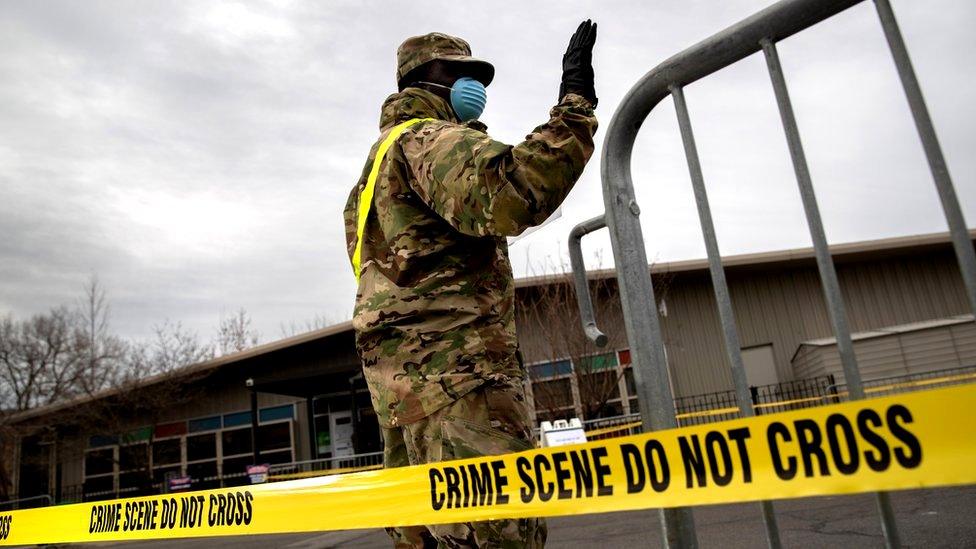Coronavirus: US tourist towns telling visitors to stay away
- Published
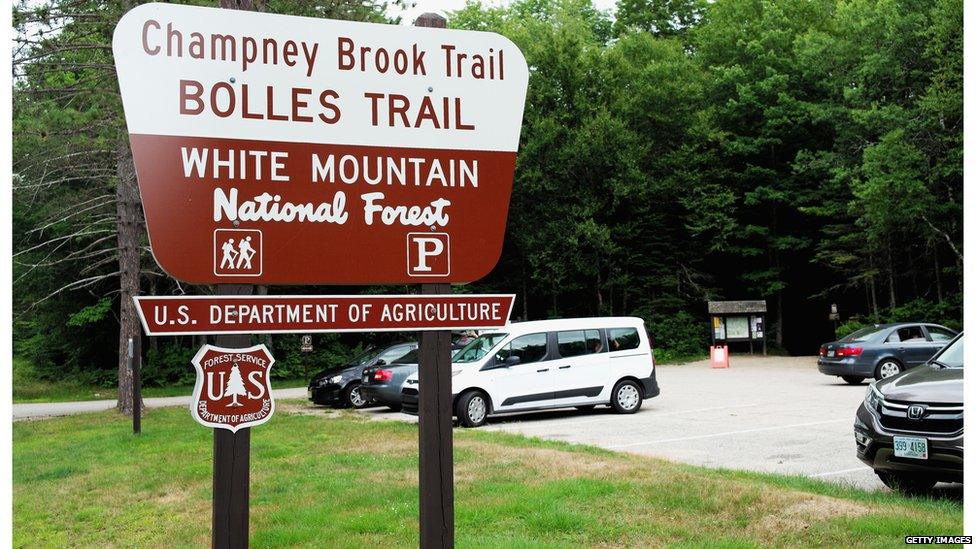
The US state of New Hampshire, with its mountains, lakes and foliage, is used to being a tourist destination for urbanites from nearby Boston and New York. But as out-of-towners flock to their summer homes to escape coronavirus in the cities, locals are begging them to stay away.
It's the start of Mud Season in New Hampshire. The temperature is rising and the snow drifts are melting rapidly leaving piles of dirt and road sand in their place. In normal times tourism would also be on the wane, the last of the spring skiers departing with the winter.
But while the threat of coronavirus has ended commercial tourism in the region, people are still travelling to the state hoping to ride out the pandemic in their holiday homes and take advantage of the region's outdoor activities.
"Don't come to New Hampshire," says Dot Seybold, general manager of OVP Management which oversees the Settlers Green retail centres in North Conway.
"I see it in my own neighbourhood where normally I don't see people in these [holiday] homes except during holidays - and they're all full now. I get it. What would you do for your family? But they're not thinking about our little community and how we will struggle to help people if this thing gets as bad as New York."
Many people seem confused by conflicting advice to get fresh air and exercise while adhering to official orders to stay at home.
The Appalachian Mountain Club said popular locations have been overrun with visitors while other organisations in New Hampshire have reported hundreds of cars with out-of-state license plates crowding parking spots at trail heads. Many facilities and trails have now been closed.
"We're all trying to process this on a day to day basis," says Janice Crawford, executive director of the Mount Washington Valley Chamber of Commerce.
"I have a mission to support the business community and keep them viable. This is a challenge during this time. [In mid-March] we sent out a press release inviting people to come and enjoy the outdoors. That was a misstep - but it was done honestly and we corrected it immediately."
At the end of March, New Hampshire had recorded 367 cases of coronavirus and three deaths compared to thousands in New York. With its state slogan "live free or die", New Hampshire is known for its libertarian values and it was the last state in the northeast to officially tell residents to stay at home.

A SIMPLE GUIDE: What are the symptoms?
US v ITALY v CHINA: How do death rates compare?
LEADING THE WAY: The US governor who saw it coming early
ON FRONTLINE: 'Nurses prepare for the worst but not this'
REASON TO HOPE: The good that may come out of this crisis

But many businesses were already closing in an effort to slow the rate of infections and discourage visitors. Most businesses - for now - appear to support the economic pain if it means containing the pandemic.
"It's coming, and if you don't stop to flatten the curve it's going to be that much worse," says Danny Rassi, owner of two restaurants - Wicked Fresh and Fire by Wicked Fresh.
"As a business owner who's responsible for multiple people, I can't do it. I can't bring my people in here and put them at risk. It makes it hard but at the end of the day if we all do it, we're all going to be on the same boat economically.
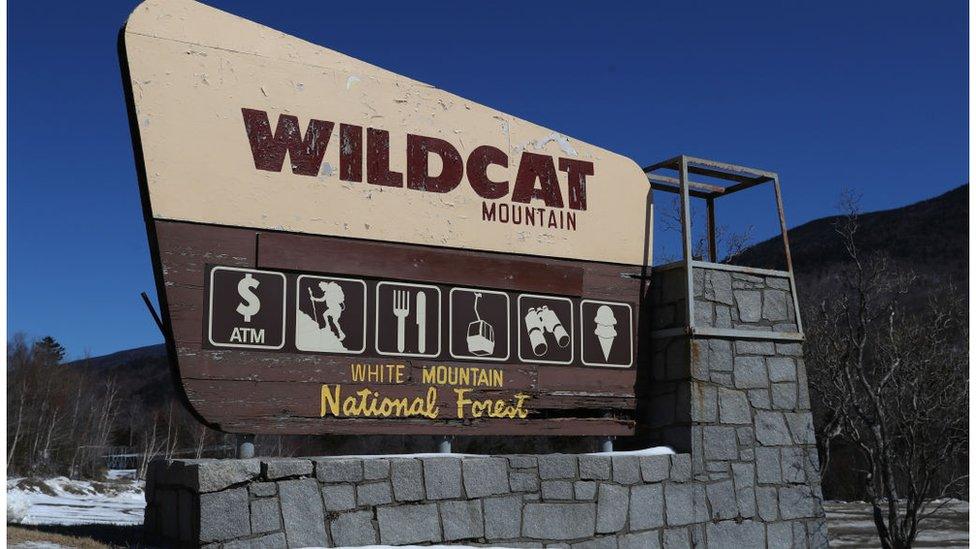
Resorts are expected to be closed through much of the spring and early summer
Gary Sullivan, owner of the White Mountain Hotel says laying off his staff has been the hardest part of the crisis so far - but he hopes the hotel can reopen in the summer.
"I'm looking at our summer bookings and they're not cancelling. We have strong summer bookings and super strong bookings for the Fall.
"At least [the shutdown] is keeping most people healthy and if people remain healthy, we will remain positive," he says.
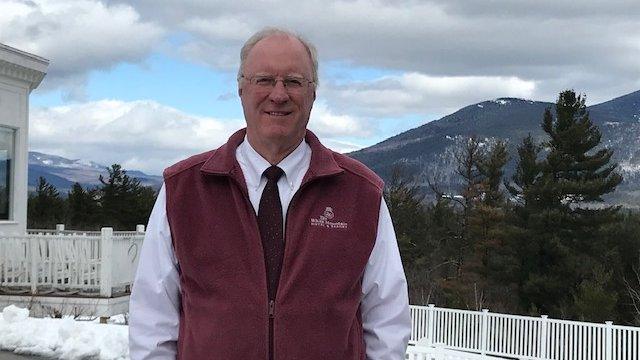
Gary Sullivan is still hopeful for the future
Dick Delaney, owner of Delaney's Hole in the Wall restaurant, also worries more about his 60 employees.
"The bulk of them are going to be dependent on unemployment checks for an indefinite period," he says. "We tried to get ahead of it and get everyone signed up - because we knew it was only a matter of time before it happened."
'My income vanished overnight with no safety net'
Some smaller establishments had already closed, but in an effort to stave off the economic blow to his staff Mr Delaney stayed open until 16 March when New Hampshire ordered restaurants to close their seating areas and offer only takeout meals.
"I felt like we were doing the wrong thing by staying open - but I was really worried about my staff."
He thinks the restrictions are necessary but is concerned about the long-term consequences.
"If this thing goes to June it will be catastrophic. There will be places that definitely won't make it. It's a tough ethical question professionally and personally," he says.
Other New England states are imposing even tougher measures to combat coronavirus. Massachusetts, which is one of the worst affected states in the nation, has declared a state of emergency. Rhode Island has ordered all out-of-state visitors to self-quarantine for 14 days, with police checkpoints on the southern border. Maine has banned short-term rentals in the city of Portland and closed its beaches.
New Hampshire's Governor Chris Sununu has resisted calls to close his state's border with Massachusetts. A legal challenge against his ban on large gatherings failed in March.
In the Mount Washington Valley, visitors who were once the economic life blood are now a source of anxiety. The Chamber of Commerce is urging people to be kind and stay positive. And while they wait for better days, businesses in North Conway are keeping the lights on at night as a beacon of hope in dark times.
- Published31 March 2020
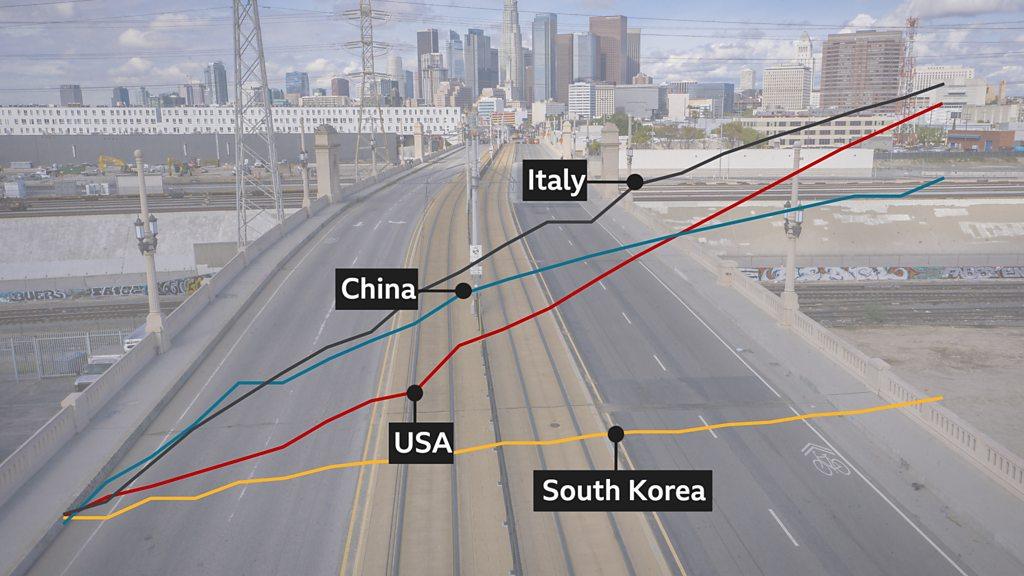
- Published29 March 2020
